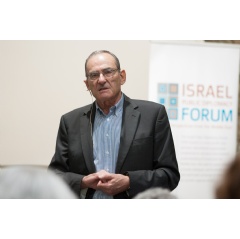Middle Eastern Expert visits Texas and explains the Ever-Changing Geo-Political Dynamic of the Region to Lawmakers, State Officials, and Business and Community Leaders
Internationally respected Professor Eytan Gilboa of the Israel Public Diplomacy Forum explains challenges for the next U.S. President
While visiting Texas with a delegation of experts who are lecturing about the Middle East and Israel, Professor Eytan Gilboa, Founder, Chair and Academic Director of the Israel Public Diplomacy Forum, argued that present developments in the battlefields of Syria and Iraq are confusing. He claims that it has become tough to know who is fighting whom and for what purpose. In speaking to Texas elected officials and business and community leaders, Professor Gilboa explained that there are many definitions of who the enemy is in the Middle East. “There is a huge gap between what leaders say and what they do. Every leader says his country fights terrorism. All say they fight ISIS, but for the Bashar el-Assad regime and Iran, the terrorists are those who have rebelled against his authoritarian rule, for the US and Saudi Arabia these rebels are freedom fighters. For Russia, every organization fighting Assad is a terrorist organization, while for Turkey, the terrorists are the Kurdish militias,” explained Gilboa.
Gilboa asserts that ISIS is constantly losing territories and influence both in Syria and Iraq, but it is far from being destroyed and is likely to offset losses in the region by severe terrorist attacks, primarily in Europe. He explained that even if the entire ISIS infrastructure is destroyed, the idea and mission that it has promoted will survive and manifest in other venues.
Gilboa said that the pro-Assad forces are gaining power, except along the Syrian-Israel border. The Syrian army supported by Iran, the Lebanese Hezbollah and the Russian air force are fighting Syrian rebel forces supported by the US, Saudi Arabia, and other Muslin Sunni states. These days, much of the fighting is held in Northern Syria, in and around the city of Aleppo. The mass killing of civilians, including women and children, the war crimes and crimes against humanity continue unabated. In recent days, the Assad forces used chemical weapons again. The professor explained that all these only amplify the moral bankruptcy of the so-called international community
Gilboa further asserted that the Obama administration considers the Kurdish military militias, especially the Syrian Kurdish People’s Protection Units (YPG), the most courageous and effective fighters against ISIS, and the most reliable US ally. Recently, YPG captured the city Manbij in Northern Syria, after a hard fought battle with ISIS.
Turkish President Erdogan was concerned about the Syrian Kurds success, and for the first time since the beginning of the civil war in Syria, has intervened militarily against them. The Kurds feel betrayed by Obama, because of his weak response to the Turkish attacks, and his demand from YPG to withdraw to their positions west of the Euphrates. Erdogan is no longer demanding the removal of Assad. Syria, Iran, and Turkey have now a similar interest in stopping the Kurds.
Gilboa explained that the main impression in the Middle East is that the US left a leadership vacuum quickly filled by President Vladimir Putin. The absence of strategic vision, the inconsistent responses to uprisings and civil wars, the lack of action against ISIS (until the beheading of several American journalists), the Iran nuclear deal, perceived by all US allies in the region to be a disaster, the very weak response to the Russian intervention in Syria and the recent betrayal of the rebels and the Kurds, have contributed to the deterioration in the US standing, and to the strengthening of the Russian influence in the region.
“In the past few weeks, Putin is even trying to replace the US as the mediator in the Palestinian-Israeli conflict. He is working to arrange a meeting between Israeli Prime Minister Netanyahu and the Palestinian president Mahmoud Abbas. This initiative demonstrates Russian strategic and diplomatic confidence in overtaking a longstanding American exclusive role in a significant political process,” Gilboa added.
Gilboa said that the next president would have to carefully reassess the US new strategic position in the Middle East and decide, to leave the region to Russian –Iranian domination or to restore ties with allies and better confront enemies and rivals.
Professor Eytan Gilboa,
Chair and Academic Director of the Israel Public Diplomacy Forum
Shifting Alliances and American Decline in the Middle East
( Press Release Image: https://photos.webwire.com/prmedia/47689/205472/205472-1.jpg )
WebWireID205472
- Contact Information
- Sharon Evans
- Director of Project Development
- Israel Public Diplomacy Forum
- Contact via E-mail
This news content may be integrated into any legitimate news gathering and publishing effort. Linking is permitted.
News Release Distribution and Press Release Distribution Services Provided by WebWire.
